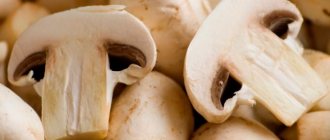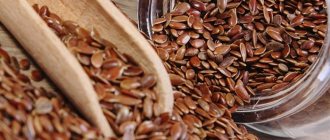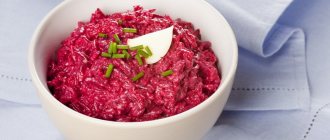09/10/2020 Alena Masheva Health During the period of breastfeeding, a woman has to adjust her diet. She needs to consume foods that will not harm the baby’s body, but will only saturate it with useful substances. Is it possible to have champignons while breastfeeding? The article provides information about the special composition of mushrooms and the possibility of their inclusion in the diet of a nursing mother.
What you need to know about champignons?
Is it possible to include mushrooms in a mother’s diet while breastfeeding? They belong to a separate class that shares similar characteristics with plants and animals. The unique taste has made mushrooms especially popular in preparing various dishes. Before including champignons in a dish, they must first be soaked in water and boiled.
It is best to buy mushrooms from trusted suppliers, since they contain harmful substances. It is highly recommended to purchase champignons from a person who grows them at home.
Ideally, the process should take place on environmentally friendly compost. In this case, you can be sure that the product does not contain harmful additives.
Composition of mushrooms
So, can a nursing mother have champignons? Their composition is unique; mushrooms contain a minimal amount of carbohydrates and fats. Champignons contain protein that is no different in composition from that found in meat. This product can provide a feeling of fullness for a long time.
Mushrooms are very sensitive to the environment, so they can absorb hazardous substances, if any.
They are low in calories, as they contain only 27 kcal. Champignons are rich in minerals and vitamins.
Champignons contain significant amounts of zinc, potassium, iodine, phosphorus, selenium and magnesium. They are not deprived of B vitamins, which are involved in hematopoiesis, heart and brain function.
Mushrooms contain amino acids (lysine, arginine). Women need them to maintain blood pressure, speed up metabolism and cleanse the body of toxins and waste.
One of the disadvantages of champignons is the presence of chitin. It is part of the cell walls of fungi, providing them with rigidity and protection in the natural environment. Chitin makes it difficult to digest protein and reduces the effect of beneficial amino acids on the body.
Useful qualities of champignons during lactation
Champignons are useful for breastfeeding because they are considered a dietary product. In addition, they are not able to absorb chemical elements that permeate the soil. Mushrooms also have the following beneficial properties:
- They replenish the water balance in a woman’s body, as they contain a significant amount of liquid. At the same time, they have a positive effect on the functioning of the digestive system, prevent dehydration and normalize metabolism.
- Cleanse the body thanks to fiber.
- Helps improve memory and normalize brain activity.
- They stabilize the functioning of the nervous system, block increased excitability and stress.
- Improves vision.
- Coping with constipation.
- Prevent weight gain and keep the body in good shape; phosphorus, along with iron, help strengthen the immune system.
- They normalize the condition of hair and skin, restore the body after childbirth, heavy physical activity or in the postoperative period, and thiamine helps eliminate headaches.
- Riboflabin helps improve liver function and is involved in hematopoietic processes.
There are a small number of contraindications to eating champignons while breastfeeding, but they still exist.
The benefits of champignons
Can you eat mushrooms while breastfeeding? The positive properties of mushrooms include:
- Properly prepared meals are quickly absorbed by the body of mother and child. Therefore, it is necessary to take into account these characteristics of mushrooms when including them in salads, soups, etc.
- Thanks to dietary fiber, the body is freed from heavy metal salts and radionuclides. Mushrooms speed up metabolism, which allows a woman to lose weight after childbirth.
- In the process of preparing dishes from champignons, a lot of moisture is lost, so the body does not suffer from edema.
- Mushrooms contain B vitamins, which improve the functioning of the nervous system. This is especially important during breastfeeding.
- When you include champignons in your diet, you will feel full for five hours.
- The minerals present in mushrooms have a positive effect on eye health.
- Natural antioxidants help improve a woman’s appearance and are especially beneficial for the beauty of hair and skin.
One of the positive features of champignons is that they can replace fish and meat dishes.
Beneficial features
Champignons are especially popular among the population of the country. They have long been cultivated and grown on an industrial scale, which makes it possible to buy quality products without fear of being poisoned by poisonous counterparts. They are easier to digest than their forest counterparts. The digestibility of mushrooms by the body is 80-90%.
Beneficial features:
- high water content allows you to maintain acid-water balance and improve metabolism;
- the fiber content allows you to remove the feeling of hunger for a long time and provide the body with the necessary amount of carbohydrates to maintain tone;
- proteins contained in mushrooms help quickly remove toxins from the body, actively participate in metabolic processes, cell construction and regeneration;
- antioxidants help improve immunity, which is especially important in the case of nursing mothers;
- minerals are represented by iron, calcium, phosphorus, iodine and zinc.
Champignon can easily become a worthy substitute for meat products. It is low in calories: 100 g contains only 27 kcal. Champignons are the safest mushrooms sold in stores. No chemical additives are used in their cultivation. Mushrooms are grown on thermally treated substrates made of straw and compost.
Rules of use
Is it possible to have champignons while breastfeeding? Before including mushrooms in your diet, you should familiarize yourself with the following rules:
- You should not buy champignons that grew along polluted roads. It is best to purchase artificially grown mushrooms that have passed the necessary controls and are completely safe for the body of a nursing mother.
- It is best to include champignons in the diet when the baby is 5 months old. You should start with one or two mushrooms, gradually increasing their number. You can exceed the dosage if the baby tolerates the product normally. It is best to eat mushrooms in the morning and not on an empty stomach.
- If a negative reaction occurs in a child, you need to contact a specialist. After all, the baby’s digestive system is not yet fully formed.
- It is not recommended for mother to eat fried mushrooms. The healthiest way to cook the product is to boil, stew or steam it.
- The daily allowance of champignons should not exceed 50 g, and the weekly allowance should not exceed 100 g.
If the child already has a food allergy, then eating champignons should definitely be avoided.
Can a nursing mother eat champignons?
Champignons, like other mushrooms, are quite heavy foods that take a lot of effort to digest.
There is no clear answer to the question of whether it is possible to eat them during breastfeeding; it is up to the mother to decide, based on her own well-being and the reaction of the baby. It is better for a nursing mother to choose champignons that are grown in special conditions that ensure their “sterility” - farms, plantations, etc. It is better to buy such mushrooms in stores, and not from hand. Although champignons can be successfully frozen or dried, during lactation it is better to give preference to fresh mushrooms. They should be young, with a film under the cap.
How champignons can be dangerous during breastfeeding: safety rules
A nursing mother should eat champignons very carefully. It is not recommended to introduce them into the diet both in the first month and in the next three; it is better to wait until the baby is 4-5 months old. It will be very difficult for a newborn baby to digest milk with mushrooms. Although if your mother often ate mushrooms before and during pregnancy, you can try them earlier.
In addition, it is not recommended for a nursing mother to eat champignons:
- for problems with the liver, gall bladder;
- “sluggish” functioning of the gastrointestinal tract (with a lack of enzymes) or its diseases;
- nausea and frequent bloating;
- diseases of the pancreas;
- for diseases of the joints or cartilage.
Another rule is that a nursing mother can only eat boiled or stewed mushrooms. Fried or pickled mushrooms contain unhealthy fat and acid from the marinade.
And, as always, when introducing a new product into the diet, you need to start with small portions (a few spoons of soup or 4-5 pieces of stewed mushrooms) and very carefully monitor the baby’s reaction, since his digestion has not yet improved and mushrooms can seriously upset him .
If an allergic reaction, colic, anxiety, flatulence or any other negative manifestations occur, champignons should be excluded from the diet for several months. To know for sure that the cause of this was mushrooms, you need to introduce them “solo” - with already familiar and proven products.
What dishes with champignons are suitable for nursing?
As already mentioned, nursing mothers can eat boiled or stewed champignons. Therefore, you can prepare delicious soups or stews, the main thing is to avoid a large amount of seasonings - use only regular salt and pepper in very small doses. In this case, it is better to chop the mushrooms as much as possible - this damages the chitin fibers and makes them easier to digest.
There are quite a few mushroom dishes allowed during lactation, so mother will not feel deprived.
Mushroom cream soup
To prepare you will need half a kilo of champignons, two onions, 50 g of butter, 2 tbsp. flour, 600 ml broth (chicken or vegetable), 200 ml cream, salt and pepper. Mushrooms are cut into slices, onion cubes are fried in oil until golden, then mushrooms are added to them and fried for 5-7 minutes. The resulting frying is ground in a blender. Melt the butter in a separate container, add flour and mix. Add some of the broth there, stir, add mushrooms and the remaining broth. The soup should have a homogeneous consistency. The resulting cream is salted, pepper is added, brought to a boil and cream is added.
Stewed champignons with apples
The list of ingredients includes only three components - mushrooms (500 g), apples (4-5 pieces, not too sweet) and mushroom broth (0.5 cup). The champignons are washed, cut into small pieces and placed in a saucepan. Add a little water and simmer for about 20 minutes. During this time, the apples are peeled and cut into slices, then added to the mushrooms, salted and filled with broth. Simmer everything together for another 10 minutes and serve.
Breastfeeding is not a reason to deny yourself small culinary joys. The main thing is to carefully monitor the quality of the products, follow the recommendations for their use and listen sensitively to the baby’s opinion, even if it is expressed in a change in the color of the “children’s surprise”.
In what form should it be included in the diet?
Is it possible to have champignons while breastfeeding? For cooking, it is best for a woman to use fresh mushrooms, but not dried or frozen. They can be included in salads, casseroles, cutlets, soups, vegetable stews and other dishes.
For preparation, you need to consider products that do not contain potentially dangerous ingredients. After all, food should not cause allergies in a nursing mother and child. To dress salads with mushrooms, you can use sour cream or yogurt instead of mayonnaise.
It is forbidden to include not only raw, but also canned or fried champignons in food. The pickled product contains hot spices and vinegar. Canned food may contain botulism bacillus, which negatively affects the nervous system. Bacteria can enter the baby's body through breast milk and lead to undesirable consequences.
Can a nursing mother eat champignons and why? It is not recommended for a woman to consume them fried for the following reasons:
- Oil makes the dish quite high in calories, so it ceases to be dietary.
- During the cooking process, nutrients are destroyed.
- When cooking, oil components turn into dangerous compounds.
- Fried champignons are more difficult for the body to digest and can therefore cause indigestion.
Dried and frozen mushrooms are generally not dangerous to the body, but contain the least amount of valuable substances.
Rules for eating champignons while breastfeeding
Dishes for a nursing mother should be nutritious, but light, so you can cook mushrooms by boiling or stewing them. You should not eat pickled mushrooms or fried champignons, this will not bring any benefit to the baby and mother. At the same time, for cooking you need to take only fresh product; neither the frozen nor the dried version is suitable, since when processing such mushrooms the beneficial properties are lost. For example, mushrooms can be baked or added to other dishes. This could be baked goods, light snacks, soups or salads. If mom is preparing a salad with mushrooms, then it is better to use sour cream or natural yogurt for dressing.
It is better to buy champignons in a store where the place of origin of the mushrooms is known. When purchasing a product from good-natured old ladies or from sellers standing along the highways, you cannot be sure of their quality.
You should not eat mushroom dishes during the first month of breastfeeding. And subsequently, when introducing the product into the diet of a nursing woman, you need to carefully monitor the baby’s reaction. An overdose of these mushrooms can also be dangerous, because a mother can afford no more than 100 grams of ready-made champignons per week.
Mushroom cream soup from champignons
Ingredients for the dish:
- liter of broth;
- fresh champignons - about 300 grams;
- one carrot;
- two potatoes;
- one onion;
- salt and herbs - to taste.
Wash the mushrooms and cut them quite finely. The potatoes are peeled and cut into squares. Peel the carrots and grate them on a coarse grater. Peel the onion, then also cut into small cubes. Boil the broth, add potatoes, boil for 10 minutes. Add the remaining ingredients and boil for about 20 minutes, stirring the soup periodically. Allow the dish to cool and then blend with a blender. You can add croutons and herbs to the serving plate.
You should not reassure yourself that champignons are considered safe mushrooms, because mushrooms of poor quality or improperly prepared can cause serious harm to the body of a woman or child. After all, each person’s reaction is individual. If you follow simple rules for eating mushrooms, you can not only diversify the menu of a nursing mother, but also eat delicious dishes without harming your health and figure.
Mushroom dishes
Is it possible to have champignons while breastfeeding? In the diet of a nursing mother, you can include dishes that will have a positive effect on the body of the child and the woman. Here are some useful recipes:
You should prepare dishes with the addition of champignons once a week. It is not recommended to eat them more often, so as not to have a negative effect on the baby’s body.
Doctor Komarovsky's opinion
A well-known pediatrician speaks positively about mushrooms as a food product. He finds them useful. But is it possible to have champignons while breastfeeding? Komarovsky is categorical in this case. He does not recommend that women consume mushrooms until the end of lactation. After all, they are not an indispensable product, so you can do without them.
The doctor reinforces his opinion with the following statement: “It is impossible to check in what conditions the mushroom grew. After all, no one can be 100% sure of their quality.”
Harm from mushrooms
Can a nursing mother eat champignons? Despite the fact that mushrooms are a common product, they are not suitable for everyone. Experts confirm that they have a number of features:
If you have a disease of the gastrointestinal tract, you should completely avoid including the product in your diet. It is also recommended to exclude mushrooms from the diet of a child under 7-8 years of age or consume them in limited quantities, due to the inability of the digestive system to cope with such loads.











